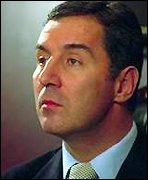
Montenegrin Prime Minister Milo Djukanovic declared Tuesday that he will resign his post despite his coalition's victory in last months parliamentary elections.
Although President Filip Vujanovic stated that Djukanovic is resigning for "personal reasons" many believe that his decision to leave after 15 years in power is largely due to the growing unrest surrounding the Albanian region of Malesia and the failure to bring unity and cohesion between ethnic and religious groups in Montenegro.
His record as President and Prime Minister has been plagued with problems since he took office. In Italy prosecutors are still investigating allegations that Djukanovic was a ring-leader in a multi-million dollar cigarette smuggling racket. This stemmed when in 2002 the European Union accused tobacco giant R.J. Reynolds in a lawsuit of selling black-market cigarettes to drug traffickers and mobsters, helping them launder profits from their illegal activities.
Among the other allegations in the lawsuit, RJR moved its cigarettes through the Balkans in the 1990s by means of illicit payments to corrupt government officials, including Milo Djukanovic, and the deceased former head of the Montenegro's Foreign Investment Agency, Milutin Lalic.
The suit said payments came from a company founded by Italian organized crime figures that had the official sanction of the investment agency and operated under the protection of Djukanovic. The company, Montenegrin Tabak Transit, was granted exclusive rights to move cigarettes through the Port of Montenegro, and over time made millions of dollars in payments to members of the Yugoslav federal government and Montenegrin regional governments, including Djukanovic and Lilic, the lawsuit states.
It says RJR executives and distributors were well aware that such "licensing fees" were being paid to facilitate the movement of their brands. They "traveled to Montenegro on a regular basis to inspect their cigarettes and service their customers and, as such, were well aware of these practices," the lawsuit states.
According to European press reports, Italian authorities had opened a criminal investigation into alleged involvement by Djukanovic with Mafia-run smuggling operations.
Also suspect is his quick rise to fortune, where Djukanovic and everyone close to him have become suspiciously rich over the years. Since he took office, Montenegro bacame a haven for tycoons wishing to launder money through fraudulant banks where anyone with $10,000 could create their own bank and funnel bogus money without undergoing verification checks.
In Montenegro you can create your own offshore bank for only $9,999, in eight weeks or less and without a background check.
The offshore status of the banks means their foreign owners benefit from tax breaks, exemption from currency controls and confidentiality (Wired News).
Senate investigators (including Carl Levin of Michigan who in 2001 spoke on this behalf in a Senate committee hearing) who say many large U.S. banks have unwittingly become conduits for dirty foreign money, see the ads as a new money-laundering danger because the "personal" banks may offer links to accounts at American institutions.
The new banks licensed by Montenegro, for example, are touted as offering correspondent accounts at the national Bank of Montenegro, which in turn is said to have accounts with major banks in Switzerland and other countries.
Today Djukanovic is facing growing pressure from ethnic Albanians in the Malesia region, who deamnd he pay more attention to minority rights and adhere to appeals for greater self-representation in all spheres of life. The arrests of Albanians made last month in Tuz also triggered an outcry from Albanians in the Diaspora calling for Djukanovic to step down after Albanians were rounded up, beaten and tortured just 24 hours before national and local elections were to take place. Many still believe that these actions were politically motivated to scare Albanians from participating in those elections.
2 comments:
This is true -- Djukanovic took advantage of a state in transition where weak institutions were disfunctional and unable to check the authority of higher officials like Djukanovic at the time. The case of Montenegro is a classic example of CORRUPTION, buyouts are common.
I remeber during my last visit to Ulqin when I got pulled over on several occasions by the police (routine roadside checks). After several minutes of haggling with the officer and insisting that the "NY" license plate on my American car is valid and current I finally gave up and slipped 20 euros in his shirt pocket; his smile told the entire story -- he shut up, moved aside and said "Hvala"
This is a small example of how the entire political, bureaucratic, judicial and adminsitrative system works, especially from the top.
This creates difficulties for us (Albanians), because it is virtually impossible to get a "fair trial" in life knowing that anyone in Montenegro can be bought for the right price, and for Albanians the price is always "double" -- no one is safe from this fact.
Look at the pot calling the kettle black and in our homeland of albania your stoped every few feet especially if they see us plates same shit all over the balkans lets keep it real cuz....anton gojcaj
Post a Comment